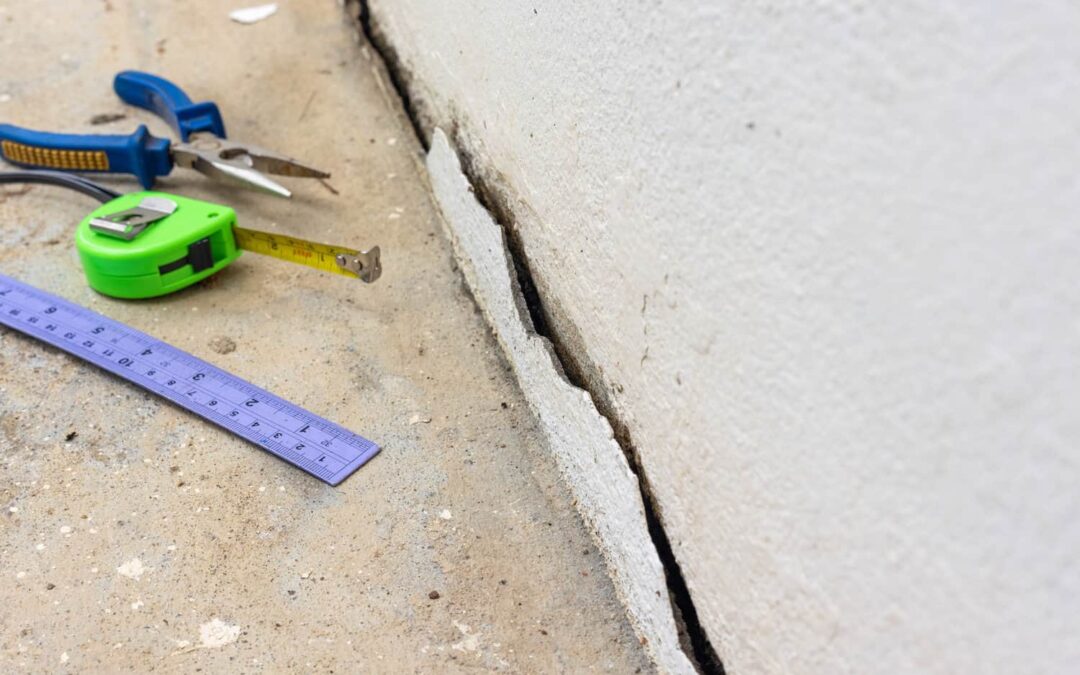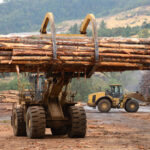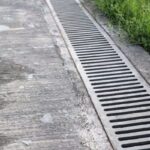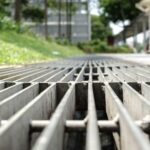This article provides a comprehensive guide to identifying major house settling signs that require foundation repair, helping you to ensure that your home is safe and secure.
Knowing how to identify the signs of major house settling can help you determine if the foundation needs to be evaluated by an experienced and knowledgeable foundation repair professional.
In this new article, we will explain the following:
- What Causes House Settling?
- Types of Foundation Settlement
- Signs of House Settling
What Causes House Settling?
It sinks down and eventually settles when you push your hand into soft mud or sand.
In the same way, the weight of the house can cause the ground underneath it to sink and settle as well.
So when the house settles uniformly at all four corners without tilting, there is no real cause for concern.
But when the house settles unevenly on one side or corner, this is a sign of foundation damage.
One of the primary causes of uneven house settling is when the soil on which the home is built is not properly compacted at the time of construction.
This can lead to the foundation settling at different rates in different areas because of changes in soil composition and moisture levels.
Another common cause of settlement is a tree growing too close to the foundation.
Tree roots spread out and pull moisture from the soil, leading to changes in the soil’s composition, which can cause settlement.
A tree may also invite rainwater to collect near the foundation and sink deep into the soil, increasing its settlement rate.
You also need to consider the type of foundation you choose at the time of construction.
Depending on the soil type, moisture content, and surrounding environment, different foundations may be more resistant to settling.
Related Article: The 3 Advantages of Hiring a Foundation Repair Contractor
However, whatever the cause of the settlement, if it is not addressed quickly, the damage to your foundation can become worse and more costly to repair.
Types of Foundation Settlement
When the weight of the home causes the soil particles to consolidate tighter, the home will settle.
There are three basic types of foundation settlement:
- Uniform settlement is when the soil settles evenly, and the house does not tilt or shift. It is generally considered normal settling as it does not cause any damage to the home’s foundation.
- Tipping settlement occurs when one end or corner of the house drops down, but the foundation is still level.
- Differential settlement is when one portion of the foundation drops significantly more than the other, causing cracks in the foundation and walls. This type of settlement can lead to structural damage and must be addressed immediately by a professional.
Signs of House Settling
When the foundation damage is minor, you will only notice slight cracks in the walls or ceilings.
However, major damage can affect the entire house and cause many problems, such as your plumbing pipes burst or your sewer lines clogged.
In addition, the cost of repairing such damage can be extremely high. So it is best to catch the signs of the major house settling early and take necessary measures.
Common signs of major house settling include:
Foundation Cracks:
Over time, your structure may experience foundation movement for various reasons, such as soil expansion, weather, and water absorption.
While it is normal for the foundation to sink and develop small vertical cracks in the first few years of being built, large horizontal cracks in the brick exterior or concrete wall indicate that your house has more than normal settling.
Even a 1/4″ gap can significantly weaken the foundation.
When examining your gaps try to determine if they are widening over time or if they seem to stay the same. If you notice an increase, it’s time to call a foundation crack repair expert.
If you notice a horizontal crack, this could be a sign of too much water pressure building up behind the foundation.
Water in the Basement:
Checking the basement after heavy rains for pooling water is important as it can indicate foundation settlement.
You can even check your basement during a rainstorm to see if there is any water entering the basement. If you find any, it’s time to call a professional for further inspection.
You Should Also Read: How to Protect Your Home Foundation from Frost Heave Damage
Cracks in Sheetrock:
Jagged cracks around windows and doors at a 45-degree angle are a sure sign that your foundation is shifting so much that it is tearing the sheetrock apart.
If your foundation is damaged, your walls may lean and bulge. In addition, you may also notice a separation between window frames and the wall.
Sticking Doors/Windows:
If the foundation moves, your doors and windows may start to stick or become harder to open and close. It can be caused by door frame distortion due to settling the house’s structure.
Uneven Floors:
One of the tell-tale signs of major house settling is a floor that is sloping or sagging.
If the foundation of your house is not solid, then it will cause the floors to become uneven and start sinking.
It can be dangerous as it may lead to falls and other accidents.
Roofs with Uneven Edges:
When looking for foundation issues, we generally look at the bottom of the house and forget about the roof.
But you should regularly check your roof for uneven edges or buckling shingles, as this can indicate signs of foundation problems.
Expansion Joints Separation:
Expansion joints are generally installed in the structure to help compensate for any settlement due to natural changes such as small shifts, soil movement, and thermal changes.
If you notice that the expansion joints have separated or become wider than before, this could mean that your foundation is failing and must be repaired.
Repairing Foundation Settlement With Foundation Experts
When you call K&B Brother’s Contractors specialists, we will send a team of experts to inspect the issue and determine the right solution.
In addition, we can provide various services, such as installing helical or steel push piers to lift and stabilize your foundation.
Depending on the severity of your settlement, we may also suggest replacing old or damaged foundation components, such as footings and beams.
This will help to prevent further settling and damage in the future.
We understand that having a foundation issue can be stressful and costly, so our foundation repair team in Northern Virginia is here to provide fast and reliable service.
We guarantee quality and affordable foundation repairs, so don’t hesitate to call us if you think your house is settling.






